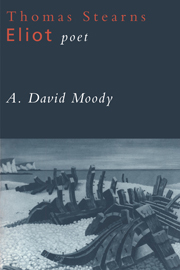Book contents
- Frontmatter
- Contents
- Acknowledgments
- Preface to second edition
- Introduction
- 1 The growth of the poet's mind
- PART ONE 1905–1912 – AN INDIVIDUAL TALENT
- Oxford University Extension Lectures
- PART TWO 1912–1922 – ‘SHALL I AT LEAST SET MY LANDS IN ORDER?’
- PART THREE 1922–1930 – ‘ORDINA QUEST’ AMORE, O TU CHE M' AMI'
- PART FOUR 1931–1939 – THE WORD IN THE DESERT
- PART FIVE 1939–1945 – APOCALYPSE
- AFTERWORDS
- APPENDICES
- A About the text of the poems
- B The drafts of The Waste Land
- C The Christian philosopher and politics between the wars
- D The secret history of Four Quartets
- E Artful voices: Eliot's dramatic verse
- Notes
- Index
D - The secret history of Four Quartets
Published online by Cambridge University Press: 05 February 2012
- Frontmatter
- Contents
- Acknowledgments
- Preface to second edition
- Introduction
- 1 The growth of the poet's mind
- PART ONE 1905–1912 – AN INDIVIDUAL TALENT
- Oxford University Extension Lectures
- PART TWO 1912–1922 – ‘SHALL I AT LEAST SET MY LANDS IN ORDER?’
- PART THREE 1922–1930 – ‘ORDINA QUEST’ AMORE, O TU CHE M' AMI'
- PART FOUR 1931–1939 – THE WORD IN THE DESERT
- PART FIVE 1939–1945 – APOCALYPSE
- AFTERWORDS
- APPENDICES
- A About the text of the poems
- B The drafts of The Waste Land
- C The Christian philosopher and politics between the wars
- D The secret history of Four Quartets
- E Artful voices: Eliot's dramatic verse
- Notes
- Index
Summary
The drafts of The Waste Land directed attention upon a crisis of personality. They exposed the diseased state of sensibility which Eliot had to express, and they made it clear that the essential action of the poem was the process by which the sensibility gradually made itself whole. Its predicament was that of being conscious, and only conscious, of ‘“the horror, the horror”’ of life; and its cure was to become wholly possessed by the horrors. The personality of the poet, in that poem, needed to realise itself through the intensification of suffering and death. Four Quartets appears to re-enact the same process, and most of all in the second and fourth movements of Little Gliding. Yet the drafts of the Quartets, and especially the drafts of those two movements, show the process being reenacted not out of urgent personal necessity, but from the head and as the working out of an idea. They reveal, moreover, that Eliot tried to give Little Gliding a grounding in private experience, and failed. This raises the question, which Henry James put so well, of how far the mastering moral sense is substantiated by felt life. The truth of The Waste Land is primary: whatever its larger cultural and human significance, it is rooted in and empowered by immediate experience and psychic energies.
- Type
- Chapter
- Information
- Thomas Stearns Eliot: Poet , pp. 327 - 341Publisher: Cambridge University PressPrint publication year: 1995



